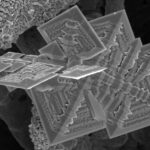Researchers at Princeton University in New Jersey have created an artificial intelligence (AI) tool to predict the behaviour of crystalline materials, a key step in advancing technologies such as batteries and semiconductors. Although computer simulations are commonly used in crystal design, the new method relies on a large language model, similar to those that power text … [Read more...] about Researchers harness large language models to accelerate materials discovery
Materials
New online academy aims to close the manufacturing skills gap
Shropshire-based digital manufacturer Protolabs has launched an online academy that aims to tackle a widening skills gap by helping engineers at any stage in their career increase their understanding of designing for injection moulding, 3D printing and CNC machining. The inspirON academy features a series of free continuing-professional-development-accredited online training … [Read more...] about New online academy aims to close the manufacturing skills gap
Engineers create tiny robots modelled on insects that may be smallest ever developed
Researchers at Washington State University have developed two insect-like robots – mimicking a mini-bug and a water strider – that they say are the smallest, lightest and fastest fully functional micro-robots ever known to have been created. The mini-bug weighs in at eight milligrams, while the water strider weighs 55 milligrams. Both can move at about six millimetres a … [Read more...] about Engineers create tiny robots modelled on insects that may be smallest ever developed
New air purifier promises virus-stopping performance and zero waste
Researchers at the University of Bath have invented a new form of high-performance air purifier that promises zero harmful waste. Key to the purifier and how it works is FOAM3R filter technology, patented by the university, which is described as a highly adaptable disruptor technology for microbial, carbon dioxide and volatile organic compound (VOC) odour removal. FOAM3R … [Read more...] about New air purifier promises virus-stopping performance and zero waste
Accounting for plastic persistence can minimise environmental impacts
Researchers at Woods Hole Oceanographic Institution (WHOI) have developed a sustainability metric for the ecological design of plastic products that have low persistence in the environment. ‘While plastic pollution threatens ecosystems and human health, the use of plastic products continues to increase,’ the researchers wrote. ‘Limiting its harm requires design strategies … [Read more...] about Accounting for plastic persistence can minimise environmental impacts






